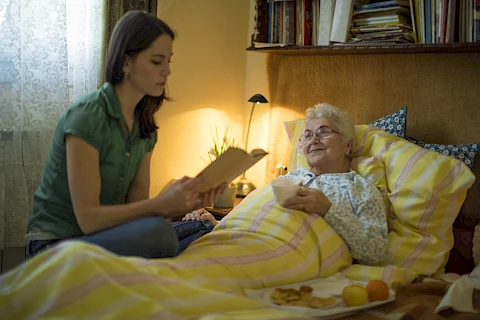
Evenings can be challenging for seniors with Alzheimer's and other forms of dementia. Known as "sundowning", this condition refers to the increased restlessness, confusion, or agitation many seniors experience in the late afternoon and evening. Understanding the triggers and implementing preventive measures can help minimize these episodes, ensuring calm and comfort in the evening hours for everyone involved.
Sundowning in Seniors
Sundowning, also known as late-day confusion, is common in seniors living with dementia or Alzheimer's disease. These individuals may exhibit restlessness, anxiety, and disorientation as sunlight fades. Factors like fatigue, low lighting, and the struggle to distinguish dreams from reality may exacerbate these symptoms. Sundowning can profoundly impact a senior's well-being, presenting an additional hurdle for caregivers to navigate.
Creating a Calming Evening Routine
An effective strategy to alleviate sundowning is to establish a calming evening routine. The rhythm of regular activities can significantly reduce anxiety and confusion in older adults. Starting with a consistent sleep schedule is vital. Ensure a consistent wake and sleep time each day to regularize their body clock. Limit their caffeine and sugar intake in the evening as these may interfere with their sleep.
Integrating light physical activities into their routine can help seniors expend energy, encouraging better rest. An early evening stroll can foster relaxation, helping clear their mind before bedtime. Patience and consistency are paramount when guiding seniors through these routines, reinforcing a sense of security and familiarity for the seniors under their care. Remember to consult a healthcare provider before introducing a new exercise routine for older adults.
Managing Environmental Factors
The surrounding environment can influence a senior's mood and behavior. Creating a soothing and secure space can make a considerable difference in managing sundowning. Ensure the house stays well-lit as the day fades. This can reduce shadows that often cause confusion or fear in some seniors.
Reducing noise and clutter can also help establish a serene environment. Too much sensory stimulation can overwhelm seniors. Maintaining a comfortable temperature indoors can also ease agitation. An environment that is too hot or cold might lead to discomfort, restlessness, and subsequent sleep disruptions.
Incorporating Soothing Activities
Engaging seniors in relaxing activities can significantly help in staving off evening restlessness. Calming music can have a soothing effect and help them unwind. Reading aloud their favorite books or sharing heartwarming stories can provide a feeling of comfort while also stimulating their cognitive functions.
A gentle massage or a warm bath before bed can be incredibly calming for some seniors. These activities can help them relax and bond with their caregivers, boosting their emotional well-being. The result is an improvement in their overall sleep quality and a reduction in sundowning symptoms.
Get Help Caring for Your Senior Loved One
Managing evening agitation in seniors requires understanding and patience. The right strategies can go a long way in alleviating sundowning symptoms. If you’re looking for quality Alzheimer’s and Dementia care for a senior loved one in Chicago, Elmwood Park, Franklin Park, Harwood Heights, or Stone Park, our team at Senior Helpers Elmwood Park is always ready to help. We provide personalized in-home care solutions to make the golden years more comfortable for the older adults in the community. Contact us today to learn more about how we can help.